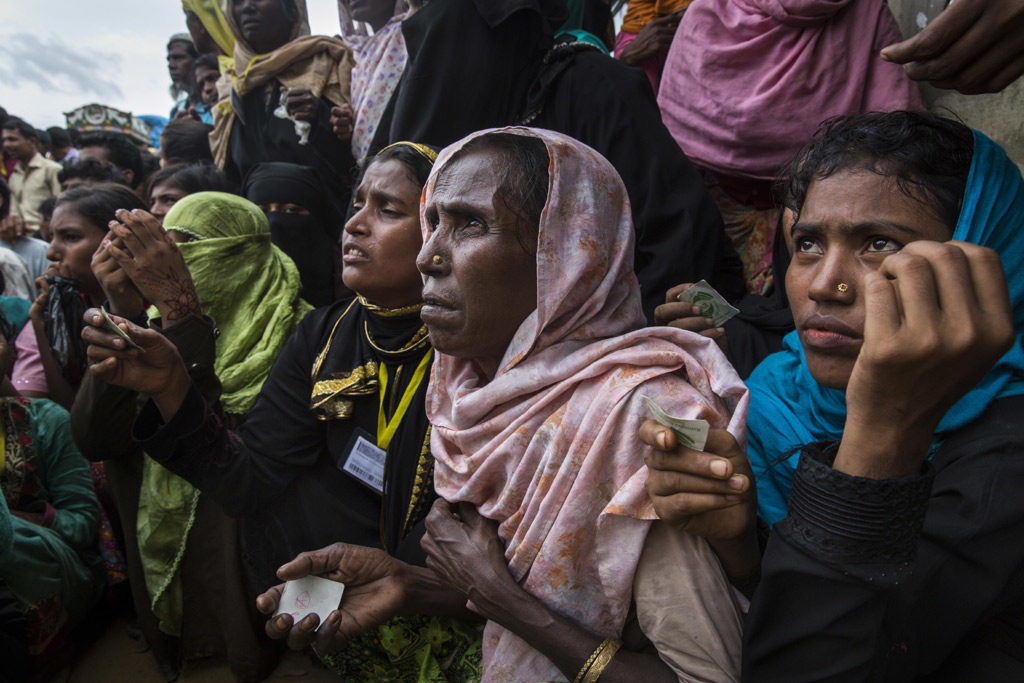Conditions in Myanmar Not Yet Suitable for Rohingya Refugees to Return Safely – UN Agency
UNITED NATIONS, 29 Jan 2018
UN News Centre – TRANSCEND Media Service
23 Jan 2018 – The necessary safeguards for Rohingyas to return to Myanmar are absent, and there are ongoing restrictions on access for aid agencies, the media and other independent observers, the United Nations warned today, two months after Myanmar and Bangladesh agreed on a plan for the refugees’ voluntary return to their homes.
“To ensure the right of refugees to return voluntarily, and in safety and in dignity, we call again on Myanmar to allow the necessary unhindered humanitarian access in Rakhine State and create conditions for a genuine and lasting solution,” Adrian Edwards, a spokesperson for the Office of the UN High Commissioner for Refugees (UNHCR) told the regular news briefing in Geneva.
Access would allow for assessment of the actual conditions and the long-term viability of the returns, as well as help address the legitimate safety concerns for any refugees contemplating their return there, he emphasized.

Rohingya refugees wait for a food distribution in Kutupalong camp, Cox’s Bazar Bangladesh.
Photo: UNHCR/Andrew Mconnell
In addition, refugees also need to be properly informed and consulted about such conditions in order for returns to be safe, voluntary and sustainable added the UNHCR spokesperson.
Also vital is the full implementation of the recommendations of the Rakhine Advisory Commission [a panel led by former UN Secretary-General Kofi Annan], including the call for peace and security for all communities in Myanmar’s Rakhine state, inter-communal dialogue, freedom of movement, access to livelihoods and achieving solutions for the legal and citizenship status of Muslim communities.
“Turning these recommendations […] into a reality on the ground is essential to building confidence for returns and addressing the tense inter-communal situation that has built up over many years in Rakhine state,” said Mr. Edwards.
“Without this, the risk of dangerous and rushed returns into a situation where violence might reignite is too great to be ignored,” he stressed.
Over 650,000 members of the minority Muslim Rohingya community have taken refuge, and more continue to arrive, in Cox’s Bazar in southern Bangladesh after having been forced to flee their homes in Myanmar’s northern Rakhine province following an outbreak of brutal violence in late-August 2017.
UNHCR remains prepared to work with both governments towards finding a long-term solution to this crisis in the interest of the refugees themselves, of both governments, the host community in Bangladesh and all communities in Rakhine state.
DISCLAIMER: The statements, views and opinions expressed in pieces republished here are solely those of the authors and do not necessarily represent those of TMS. In accordance with title 17 U.S.C. section 107, this material is distributed without profit to those who have expressed a prior interest in receiving the included information for research and educational purposes. TMS has no affiliation whatsoever with the originator of this article nor is TMS endorsed or sponsored by the originator. “GO TO ORIGINAL” links are provided as a convenience to our readers and allow for verification of authenticity. However, as originating pages are often updated by their originating host sites, the versions posted may not match the versions our readers view when clicking the “GO TO ORIGINAL” links. This site contains copyrighted material the use of which has not always been specifically authorized by the copyright owner. We are making such material available in our efforts to advance understanding of environmental, political, human rights, economic, democracy, scientific, and social justice issues, etc. We believe this constitutes a ‘fair use’ of any such copyrighted material as provided for in section 107 of the US Copyright Law. In accordance with Title 17 U.S.C. Section 107, the material on this site is distributed without profit to those who have expressed a prior interest in receiving the included information for research and educational purposes. For more information go to: http://www.law.cornell.edu/uscode/17/107.shtml. If you wish to use copyrighted material from this site for purposes of your own that go beyond ‘fair use’, you must obtain permission from the copyright owner.